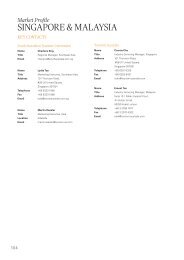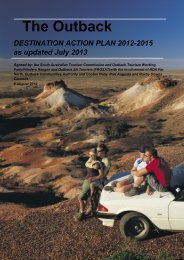Flinders Ranges and Outback Integrated Strategic Tourism Plan
Flinders Ranges and Outback Integrated Strategic Tourism Plan
Flinders Ranges and Outback Integrated Strategic Tourism Plan
Create successful ePaper yourself
Turn your PDF publications into a flip-book with our unique Google optimized e-Paper software.
Final <strong>Plan</strong><br />
Introduction <strong>and</strong> Purpose of this <strong>Plan</strong><br />
1.4 Barriers to Capitalising on that Appeal<br />
Most of these barriers are not unique to the <strong>Flinders</strong> <strong>Ranges</strong> <strong>and</strong> <strong>Outback</strong> South<br />
Australia; they are being experienced by regions across Australia.<br />
Travel behaviour is influenced by many factors, but most significantly by<br />
economic health in the place visitors come from <strong>and</strong> by the general<br />
consumption patterns of those people.<br />
Significant factors that are currently having an impact on domestic holiday<br />
travel include:<br />
• Higher levels of personal <strong>and</strong> household debt (particularly given recent<br />
interest rate rises).<br />
• Changing household consumption patterns (increases in spending on<br />
communications, household goods, home entertainment systems,<br />
furnishing, renovations <strong>and</strong> health).<br />
• Increased overall costs of domestic travel (excluding airfares to capital<br />
cities) reducing affordability <strong>and</strong> competitiveness (particularly because of<br />
steep increases in fuel prices).<br />
• Australians travelling overseas more (particularly from Sydney <strong>and</strong><br />
Melbourne). This is due in part to better exchange rates <strong>and</strong> increases in<br />
seat capacity <strong>and</strong> holiday deals to New Zeal<strong>and</strong> <strong>and</strong> South East Asia.<br />
• Changes in the labour market making travel more difficult (increasing<br />
casualisation of the workforce, long working hours <strong>and</strong> people not taking<br />
their holiday leave).<br />
Basically people have less time <strong>and</strong> money to spend on travel <strong>and</strong> prefer to<br />
spend it on making their home environment convenient, comfortable <strong>and</strong><br />
entertaining (this trend has been dubbed ‘cocooning’ by futurists).<br />
At the same time, with cheaper overseas airfares along with the rising value of<br />
the Australian dollar, there has been strong growth in the more exotic<br />
outbound travel. Outbound departures are forecast to grow at an average<br />
annual rate of 5.2% to 2016 to reach a total of 8.22 million.<br />
In addition, regions, other than the Queensl<strong>and</strong> holiday destinations, have<br />
been hit by an increase in low cost air carriers focussed on capital cities <strong>and</strong><br />
the Queensl<strong>and</strong> holiday regions, much higher fuel prices <strong>and</strong> a lack of the<br />
st<strong>and</strong>ard of accommodation which is being sought by discerning travellers.<br />
Lack of time (the Australian working population has 88 million days of holiday<br />
leave accrued), affordability, other consumer priorities <strong>and</strong> the industry’s lack<br />
of competitiveness are major issues confronting all destinations. Changes to<br />
Urban & Regional <strong>Plan</strong>ning Solutions<br />
d:\frosa region istp\frosa region istp.doc Page 2





